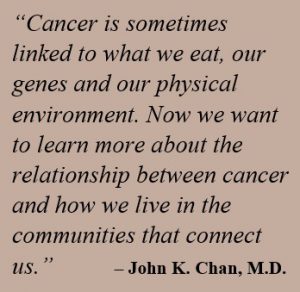A new medical study at Sutter’s California Pacific Medical Center is helping determine the potential link between an individual’s social interactions – or lack thereof – and their risk of developing cancer.
The study is being performed by John K. Chan, M.D., an oncologist and researcher at the CPMC’s Research Institute and Sutter’s Palo Alto Medical Foundation, in collaboration with Brown University and Stanford University.
“Cancer is sometimes linked to what we eat, our genes and our physical environment,” says Dr. Chan. “Now we want to learn more about the relationship between cancer and how we live in the communities that connect us.”
The study will build upon existing findings in this field and will advance knowledge of the potential link between study participants’ extent of social interactions, their risk of developing cancer and, for those individuals with cancer, how health outcomes are impacted by social connectivity.
“The same way prolonged periods of stress can cause increased and sustained levels of the body’s stress hormone cortisol, social isolation also needs to be looked at as a ‘stressor’ that drives inflammation in the body and leads to chronic illnesses,” Dr. Chan said.
 CPMC’s study will focus on loneliness, which has been associated with an increased level of fibrinogen—a biomarker of inflammation associated with cancer and cardiovascular disease. Fibrinogen has also been linked with increased risk of ovarian cancer and other cancers, as well as poor outcomes with cancer progression.
CPMC’s study will focus on loneliness, which has been associated with an increased level of fibrinogen—a biomarker of inflammation associated with cancer and cardiovascular disease. Fibrinogen has also been linked with increased risk of ovarian cancer and other cancers, as well as poor outcomes with cancer progression.
For individuals living with cancer, Sutter Health in Northern California offers several survivorship programs that help patients make healthy lifestyle choices, access social support and connect with educational and community resources to improve and manage long-term wellness. Cancer patients may also access support groups and classes that combine conventional medical treatments with evidence-based supportive services and integrative practices to strengthen and enhance overall well-being.
For women in the San Francisco Bay Area, the Ovarian and Reproductive Cancer Recovery Program at CPMC’s Center for Women’s Health Care assists individuals who are undergoing treatment for uterine, ovarian, cervical, vaginal, vulvar and peritoneal cancers.
For more on research studies and clinical trials at Sutter, visit www.sutterhealth.org/research.





